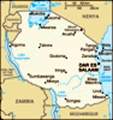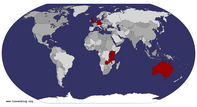Advertisement
Published: January 18th 2007

 The School of St Jude
The School of St Jude
Front gate at the end of the dusty road to schoolWe arrived into Mount Kilimanjaro airport late on the evening of Wednesday 3rd January. We were able to see the school and surrounding area the next day when we did a tour of the school and went into the town of Arusha to get some basics. We are about 7kms out of the town of Arusha, in the very small ‘village’ of Moshono. The tarred road ends a couple of kms before the school, so it is a bumpy ride! The area and city is really how we imagined - dusty, dirty, lots of people, basic shops if you exclude ‘shoprite’ supermarket!, women carrying many things on their heads, Masai warriors strolling along, groups of locals watching the tourists, children running out of their homes to see you, etc. The school itself sits at the base of Mount Meru, a beautiful backdrop. The old part of the school is fairly basic with two storey brick buildings, an open dining area / hall where amazingly 850 children come to eat lunch at the same time! We were warned to chew our rice slowly because there are ‘rocks’ in it! (they do sieve it, so they are only tiny ones, but it is

 Mount Meru
Mount Meru
The school sits at the base of Mount Meru which provides a fantastic backdrop for the school yard. Picture taken out of the office looking over the school assembly / lunch hallstill not pleasant). This has happened a couple of times to me, so I have given up the rice already and just opt for the accompanying dish, which is generally quite nice. Although on the days that other subject teachers sit with my class, I then head back to the communal kitchen for cheese, crackers and tomatoes! Simon has been game to eat the school dinners every day, though he is not sure how long this will last as they are hot meals which repeat every week. The new part of the school, which has only just been completed is very swish, and the grounds are lovely. There are many workers - “fundis” always busily washing, cleaning, gardening and building.
We have been here for a week and a half now and are beginning to settle down after the initial adjustment period. I have been bitten many times by the mossies, so have to spray myself first thing in the morning not just at dusk. Apparently only a few people get malaria, as most are not ‘malaria carrying’ mosquitoes, and if you do get it, people view it as we would getting flu back home?!?! We are hoping to

 New Term Starts
New Term Starts
The school buses start to turn up with happy eager kids ready for a new yearmove into our new accommodation in a couple of days, so have been in the shared short term accommodation block. Sleep hasn’t been great and having to go to an outside building to use the toilet - when trying to be alert for the German shepherd guard dogs or the Masai guards - really wakes you up! The deadline is apparently an African one - so keeps moving!! But we are very grateful for what we are moving into, basically a small one bedroom apartment with its own bathroom and small lounge area. We share the communal kitchen with the ‘older’ people and there is a kitty system and a rotating cooking schedule, so it is very social. Jobs are alternated including the kitty shopping which happens once a week on a Saturday, this is an adventure as you go to the local markets to buy most of the items and are surrounded by people wanting to help you as you get off the St Jude school bus. When we first went there the day after we arrived we really felt like we were in Africa. Everything has to be bargained for but on the whole is pretty cheap -

 New Term Starts
New Term Starts
Kids lining up in their classesthe whole shop for 10 people, for a week was about $60 (25 pounds). Fortunately meat is bought at the local supermarket, as there is no refrigeration system in the markets! We have been eating very well with lots of fruit and veggies, and meat just once or twice a week.
School began on Tuesday and I have to say when Friday arrived I felt as if I had been here for a month already!! Only 4 hours sleep a night doesn’t help I guess. I have a ‘homeroom’ which I have first thing and last thing for about 20 mins, where we say a prayer, organise homework diaries, take the register etc. I then have this same class for 14 English periods a week and I’m also involved in the very new extension program, I have already started working with 6 kids and I also take ‘remedial’ classes, which begin next week. One page lesson plans have to be written for each period, which are then checked each fortnight by the head of department. I have spent the remaining time making the room look like a classroom - they are quite dark as the windows are high up

 Standard Class 1C with Miss Rachel
Standard Class 1C with Miss Rachel
Rachel's very happy to have her very own class for the first time as a teacherin the wall (with no glass) and concrete floors, though we have mats we put down for floor work. I have 21 kids at this stage, with another 8 arriving next week, they are standard one (year 1) but most have been to government schools previously, which teach in Kiswahili. Age ranges from 6-8 years, about half do not understand English - this became apparent when half did not do the first piece of English homework but they had all done the homework for the Kiswahili teacher!
The kids are gorgeous, we are not told too much about them but some are from orphanages and some have HIV, and all are from the poorest backgrounds. House checks are carried out to ensure the children are from the most disadvantaged areas, that said the kids have to sit a test (in Kiswahili) to get into the school - Gemma wants to provide this high quality free education to those that have the best potential to make a difference in their community. Only about 10% of the thousands of children that turn up get into the school, which is why Gemma wants to continue building more and more schools. Apparently the

 Red Kitchen members
Red Kitchen members
The volunteers are split into 2 houses and this is our group, the older group.government schools have about 60 kids in a class and the kids get beaten, in fact during the staff training day, our jaws dropped (the western teachers, about 10) when Gemma explained to the local teachers (about 50) that the fine for hitting a child was to increase and if it happened on the second occasion they would be sacked! I was heartbroken when one day while I was talking, I used a ruler (which a boy had just handed to me because he had two and not one) to point at the timetable, a child who had just asked to go to the toilet, jumped and ran away from me back to her desk when she saw me waving the ruler. When I went to her and said yes she could go to the toilet she wouldn’t move, so I had to take her hand and literally lead her out. I think there is a careful balance here of respecting the existing culture and making changes for the better. It took me almost all week to explain to the kids that they do not need to empty their desk and take every single book home each night, and in

 The local bar
The local bar
The local bar right outside the gate of the school mainly here to serve the overseas drinkers. Run by Colin, who proudly calls himself the only gay in his village !!the end I got a local teacher to explain to them (we are not really meant to do this, as they have found that the classes where only English is spoken ie. with the western teachers, that the kids’ English improves a lot more quickly). Apparently this is because they are used to not owning much and guard it with their life when they do. The following day there were all these excited gasps when the kids ran into the class and lifted their desks to find that all the contents were still there! The kids are very enthusiastic and really want to be at school, they are very well behaved and particularly love more creative classes - which Gemma is really trying to encourage versus the traditional chalk and talk method. So while the language barrier is of course a problem, the day is very rewarding and does not feel draining because the kids are an absolute pleasure to have.
Simon is officially one of the ‘school accountants’ although has been the ‘cable fundi’ this week as the office has been renovated and recabled, so he spent most of the week under desks! He has made time to
play football with the kids at lunchtime - thanks to balls brought by another western teacher - this is amazing, hundreds of kids run around in the midday sun chasing the ball and having a great time. During his first few days he was asked to do some government tax returns, which had been put off for months and he used his first piece of carbon paper in about 15 years!! Although he has been helping the IT guys out all week getting the office up and running after the move, he thinks there are lots of areas where he will be able to help improve systems.
Social activities have included a visit to the local bar - chairs under a tin shed basically, and then a visit to the local restaurant called the ‘Masai Camp’ which was actually really pleasant, with nice food and environment. Tomorrow (Sunday) we are going to the Mondooli craft markets, which are the Masai peoples’ markets, which very few tourists get to.
Advertisement
Tot: 0.191s; Tpl: 0.015s; cc: 18; qc: 95; dbt: 0.1376s; 1; m:domysql w:travelblog (10.17.0.13); sld: 1;
; mem: 1.3mb












Susan Jones CCA
non-member comment
What can we do to help
Sounds like you are settling in well and it is a huge experience that you will never forget. Reading about the children and their backgrounds just wondering what we could do to help. simon - we talked before you left about sports equipment etc for football 9shirts , balls etc0 vene if it is just soemthing small we could send over that would be fun or something bigger eg books - can you think about it and see if there is an easy way to get something over and then suggest what could make a difference to you. Keep working on avoiding malaria Susan